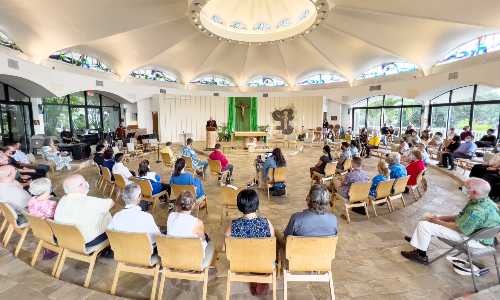In late 2021, Pope Francis called on the whole of the Catholic Church to embark on a two-year journey of reflection, profound renewal, and transformative reform that seeks to touch every element of ecclesiastical life and drive an ongoing process of reflection among Catholics worldwide.

As Most Reverend Robert McElroy, Bishop of San Diego, explained in a recent Marianist Lecture at the Mystical Rose Oratory, this process of “synodality” is not about issuing new documents from Rome but embracing change together. It is, he added, “a continuing call to reform within the life of the Church.”
Bishop McElroy acknowledged that the term “synodality” is confusing and has been misunderstood.
And so, in unpacking it during his lecture on February 27, Bishop McElroy first noted that the concept of synod is not new but rather ancient and refers to a “coming together” or a religious assembly. “Pope Francis is calling for a moment of rediscovering, of going back and rediscovering part of our tradition,” he said.
In outlining the “architecture of synodality” at both the parish and personal level, Bishop McElroy said the process presents several key themes. Among them: that synodality “points to the reality that the whole people of God are engaged and journeying together in the life of the Church” and also demands a “constant state of discernment”—seeking answers as part of a community and in dialogue.
Bishop McElroy also underscored the importance of “authentic listening” and empowering diverse voices.
“A synodal church is a humble and honest church,” he said. “A synodal church seeks to discern its woundedness and embrace reform. Its holiness is exemplified by humility. A synodal church seeks a healthy decentralization in its structure and life. Practices that exclude groups must be rejected.”
Bishop McElroy continued, “Pope Francis has called us to transform the life of the Church and in turn the life of the world.” And that work—the process of reflection, listening and mission—“is not the work of a moment, but the work of a lifetime. At this moment, it is our work and is our mission.”

The global conversations on synodality in the Catholic Church will culminate with an international gathering in October 2023, during which church leaders will seek to explore key themes identified at dioceses. Bishop McElroy, however, cautioned against thinking of the dialogue as something that ends there. “This notion of synodality is a process of conversation. It doesn’t end at a particular time,” he said.
Bishop McElroy delivered his address before an audience both online and in person, and then participated in a question-and-answer session to clarify key points or explore new ones. The talk was presented as part of the ongoing Marianist Lecture series, sponsored by the Marianist Center of Hawaii, Chaminade University and Saint Louis School, and designed to foster inclusive and robust dialogue.
Following his address, Bishop McElroy was presented with the Mackey Award for Catholic Thought.
Several attendees at the lecture thanked Bishop McElroy for helping them to understand the concept of synodality. They also wondered aloud about next steps, including what they could do to participate in the conversation and encourage their fellow parishioners to do the same.
“I think what stuck out most to me was the real inward focusing of it, about listening, changing our stance as a church to be more humble and just more understanding,” said Sebastian Conway-Phillips.
Another attendee, Our Lady of Good Counsel School Principal Chantelle Enos-Luarca, said the faculty and staff members at her campus participated in a robust dialogue as part of the process of synodality.
“We have some great ideas … but what’s next?” she asked.
Bishop McElroy responded, “I think the most important consequences are the conservations that occur at the local level. All of these parishes, there are certain things that come up that are good things to do.” He added that there’s no need to wait on implementing those good ideas. “Do them now,” he said.
Watch the entire Marianist Lecture below.



